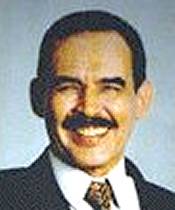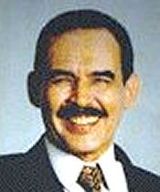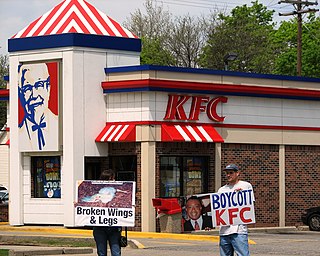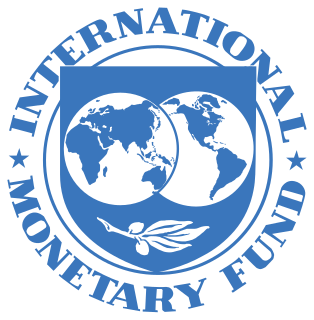
The first fully democratic Presidential election since 1960 occurred on 11 March 2007. The election was the final transfer from military to civilian rule following the military coup in 2005. This was the first time the president was selected by ballot in the country's history. The election was won by Sidi Ould Cheikh Abdallahi, who was ousted by a military coup in 2008 and replaced by general Mohamed Ould Abdel Aziz.
The Union for Democracy and Progress is a political party in Mauritania. The UDP is led by Naha Mint Mouknass, and as of early 2008 it is the only political party in Mauritania that is headed by a woman.

Ret. Col. Mohamed Khouna Ould Haidallah was the head of state of Mauritania from 4 January 1980 to 12 December 1984. He was an unsuccessful candidate in the 2003 presidential election and the 2007 presidential election.

Colonel Ely Ould Mohamed Vall was a Mauritanian political and military figure. Following a coup d'état in August 2005, he served as the transitional military leader of Mauritania until 19 April 2007, when he relinquished power to an elected government.

The Military Council for Justice and Democracy was the supreme political body of Mauritania. It served as the country's interim government following the coup d'état which ousted the President, Maaouya Ould Sid'Ahmed Taya on 3 August 2005. It was led by the former director of the national police force, Colonel Ely Ould Mohamed Vall. After seizing power it quickly pledged to hold elections within two years, and promised that none of its own members would run. A few days after seizing power, Vall named Sidi Mohamed Ould Boubacar as Prime Minister following the resignation of Taya's last Prime Minister, Sghair Ould M'Bareck.

A Mauritanian presidential election occurred on 11 March 2007. Since no candidate received a majority of the votes, a second round was held on 25 March between the top two candidates, Sidi Ould Cheikh Abdallahi and Ahmed Ould Daddah. Abdallahi won the second round with about 53% of the vote and took office in April.

The 2005 Mauritanian coup d'état took place on 3 August 2005. The long-serving dictator Maaouya Ould Sid'Ahmed Taya was ousted by the Armed Forces of Mauritania and replaced by the Military Council for Justice and Democracy, headed by Ely Ould Mohamed Vall, while Taya was in Saudi Arabia attending the funeral of King Fahd bin Abdul Aziz Al Saud. A constitutional referendum, parliamentary and presidential elections were scheduled and the coup leaders vowed not to contest any of the elections. The military government ended with the presidential election on 11 March 2007.
Ahmed Ould Daddah is a Mauritanian economist, politician and civil servant. He is a half-brother of Moktar Ould Daddah, the first President of Mauritania, and belongs to the Marabout Ouled Birri tribe. He is currently the President of the Rally of Democratic Forces (RFD) and was designated as the official leader of the opposition following the 2007 presidential election, in which he placed second.
Cheikh El Avia Ould Mohamed Khouna is a Mauritanian political figure. He was the 7th Prime Minister of Mauritania from January 2, 1996 to December 18, 1997, Minister of Foreign Affairs from July 12, 1998 to November 16, 1998, and Prime Minister again from November 16, 1998 to July 6, 2003 under President Maaouya Ould Sid'Ahmed Taya; later, he briefly served as Minister of Foreign Affairs again in 2008.

Senatorial elections were held in Mauritania on 21 January 2007 and on 4 February 2007. There are 56 seats in the Senate. The senators were elected by 3,688 municipal councillors, except for three who were chosen by the elected senators.

Sidi Mohamed Ould Cheikh Abdallahi is a Mauritanian politician who was President of Mauritania from 2007 to 2008. He served in the government during the 1970s, and after a long period of absence from politics he won the March 2007 presidential election, taking office on 19 April 2007. He was deposed in a military coup d'état on August 6, 2008.
The People's Progressive Alliance is a political party in Mauritania.

A presidential election was held in Mauritania on 18 July 2009. Mohamed Ould Abdel Aziz, who led the 2008 coup d'état, won a narrow first-round majority in the election, according to official results. A second round, if necessary, would have been held on 1 August 2009.

Presidential elections were held in Mauritania on 24 January 1992. They followed the constitutional referendum the previous year that resulted in the reintroduction of multi-party democracy, and were the first presidential elections to feature more than one candidate. The result was a victory for incumbent President Maaouya Ould Sid'Ahmed Taya of the Democratic and Social Republican Party, who defeated three other candidates with 62.7% of the vote. Voter turnout was just 47.4%.

Parliamentary elections were held in Mauritania on 23 November. The opposition has vowed to boycott the election unless the president steps down beforehand. A total of 1,096 candidates have registered to compete for the leadership of 218 local councils across Mauritania, whilst 438 candidates are contesting for the 146 parliamentary seats. Some 1.2 million Mauritanians were eligible to vote in the election. The first round results yielded a landslide victory for the ruling UPR winning 56 seats and their 14 coalition partners winning 34 seats. The Islamist Tewassoul party won 12 seats. The remaining seats were contested in a runoff on 21 December 2013. The UPR won the majority with 75 seats in the Assembly.
Mohamed Lemine Ch'bih Ould Cheikh Melainine is a Mauritanian politician. He has also served as the leader of the Qadiriyya Islamic brotherhood.

Presidential elections were held in Mauritania on 21 June 2014, with a second round planned for 5 July if no candidate received more than 50% of the vote. The result was a first round victory for incumbent President Mohamed Ould Abdel Aziz of the Union for the Republic, who received 82% of the vote. Most of the opposition parties boycotted the election.
















